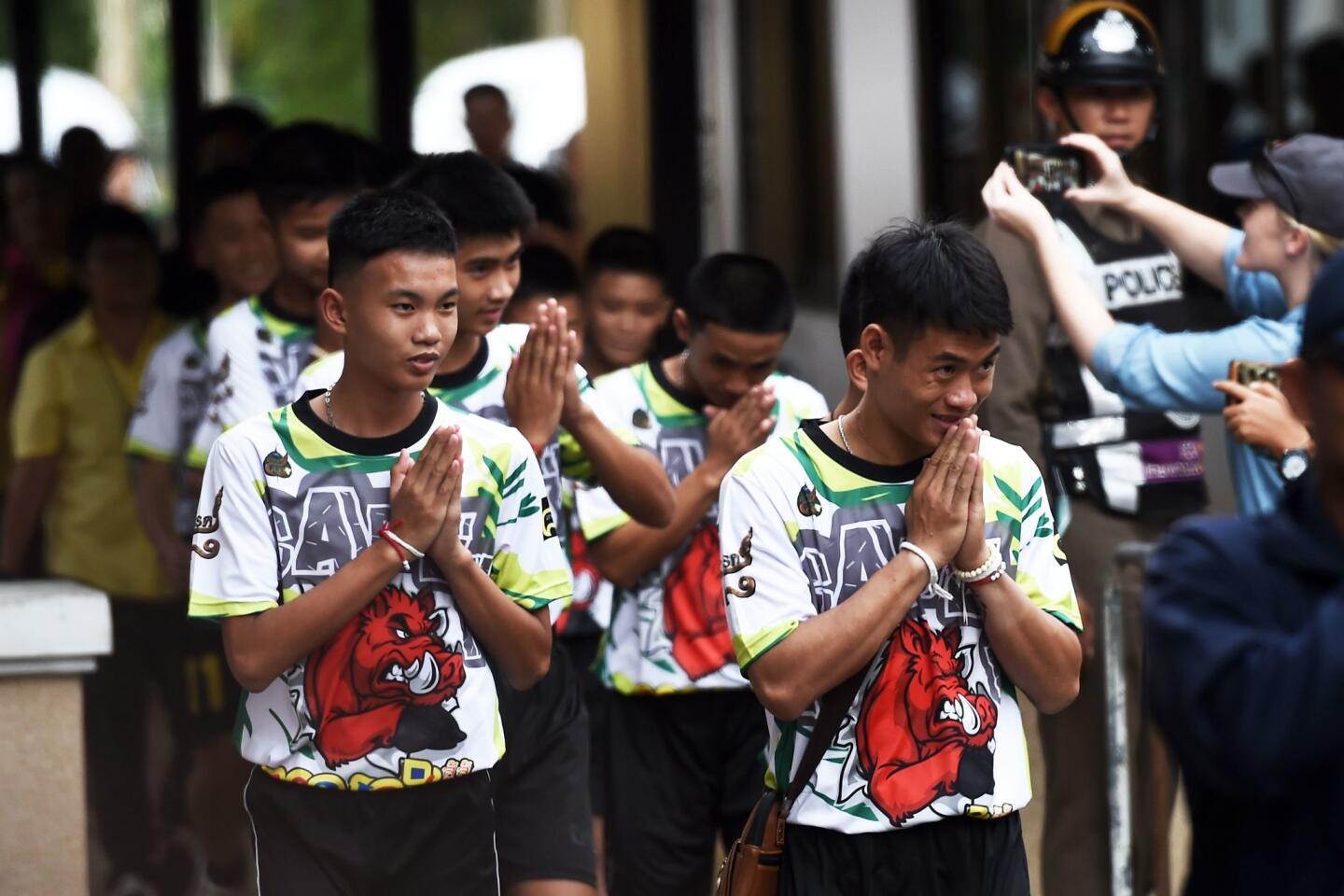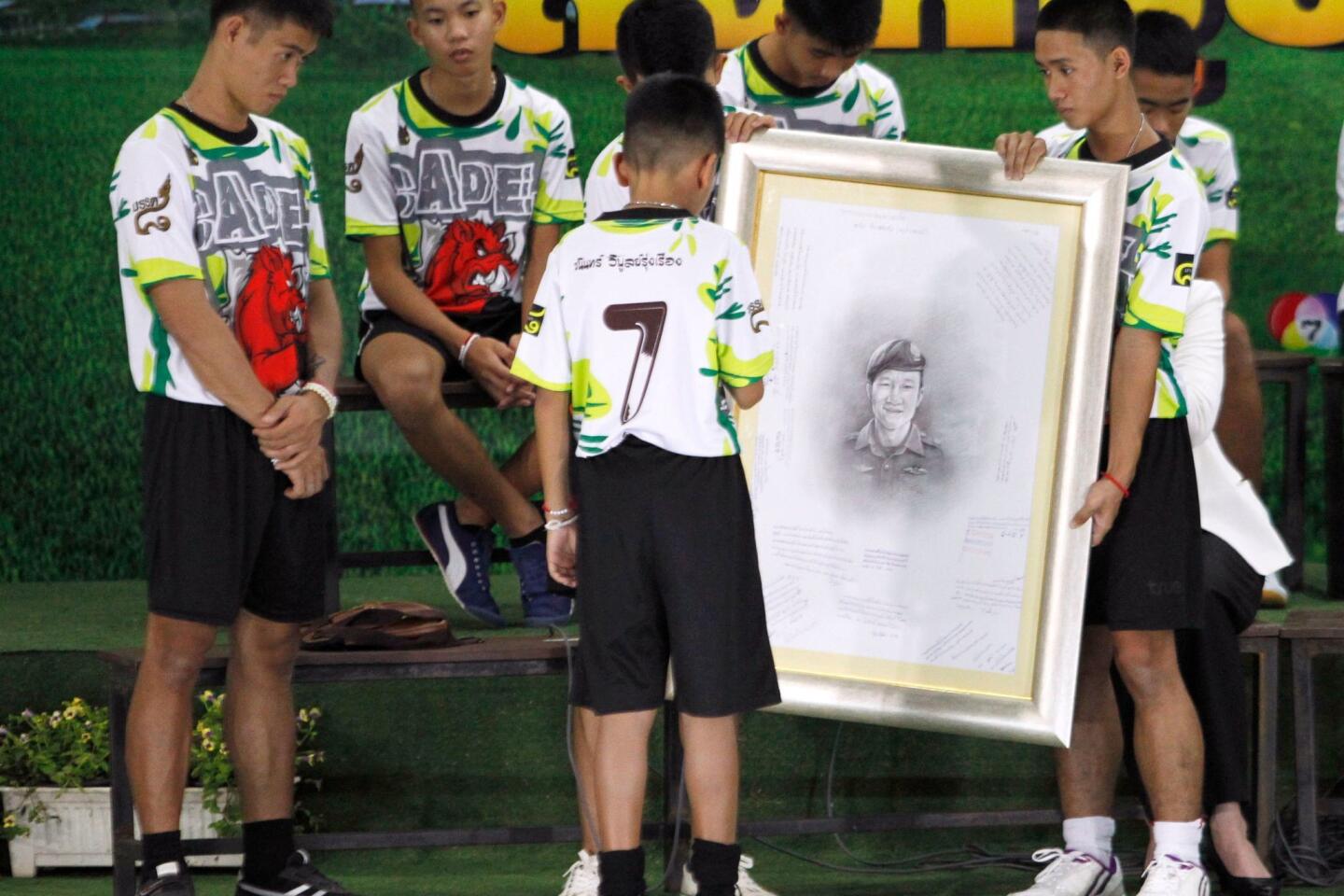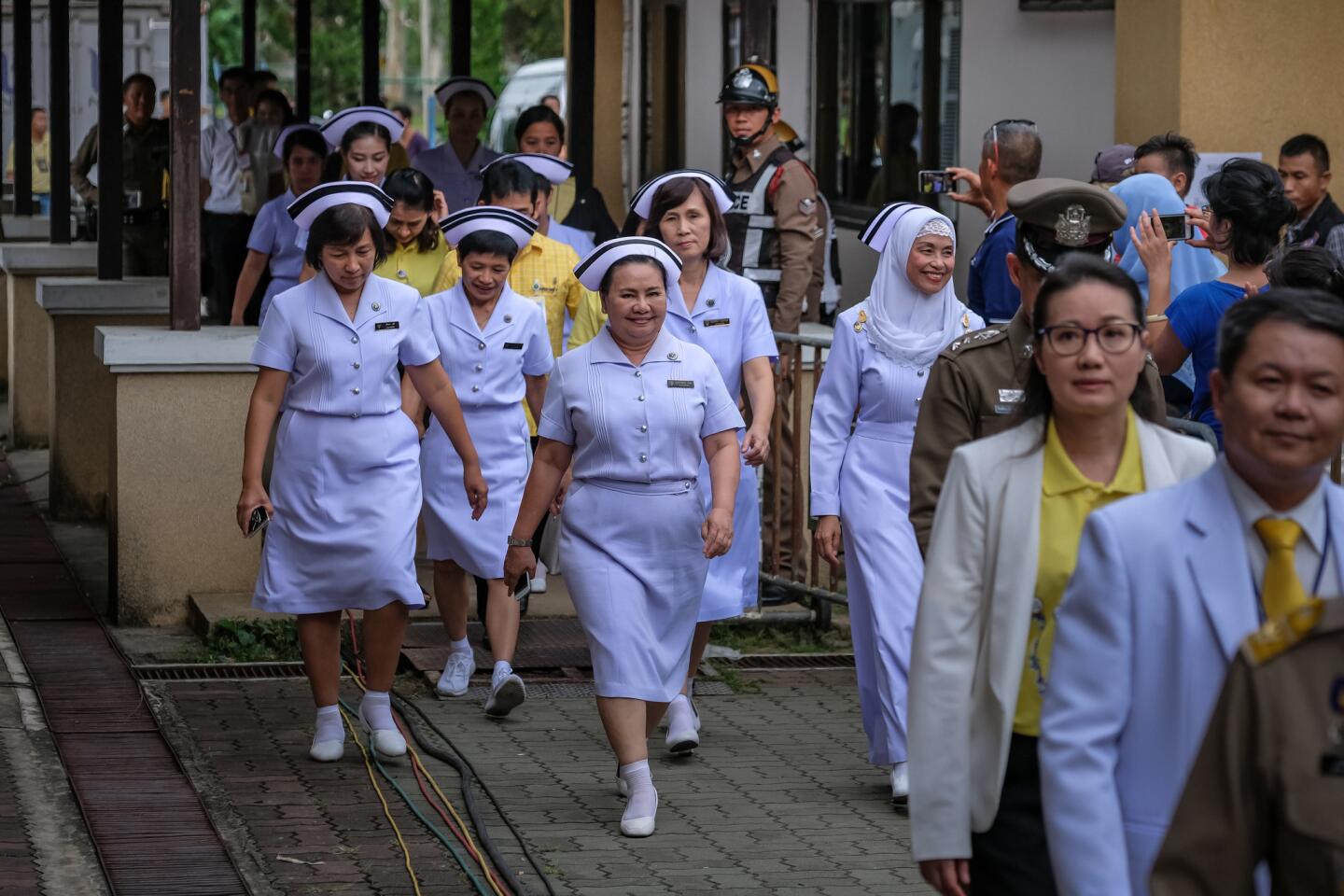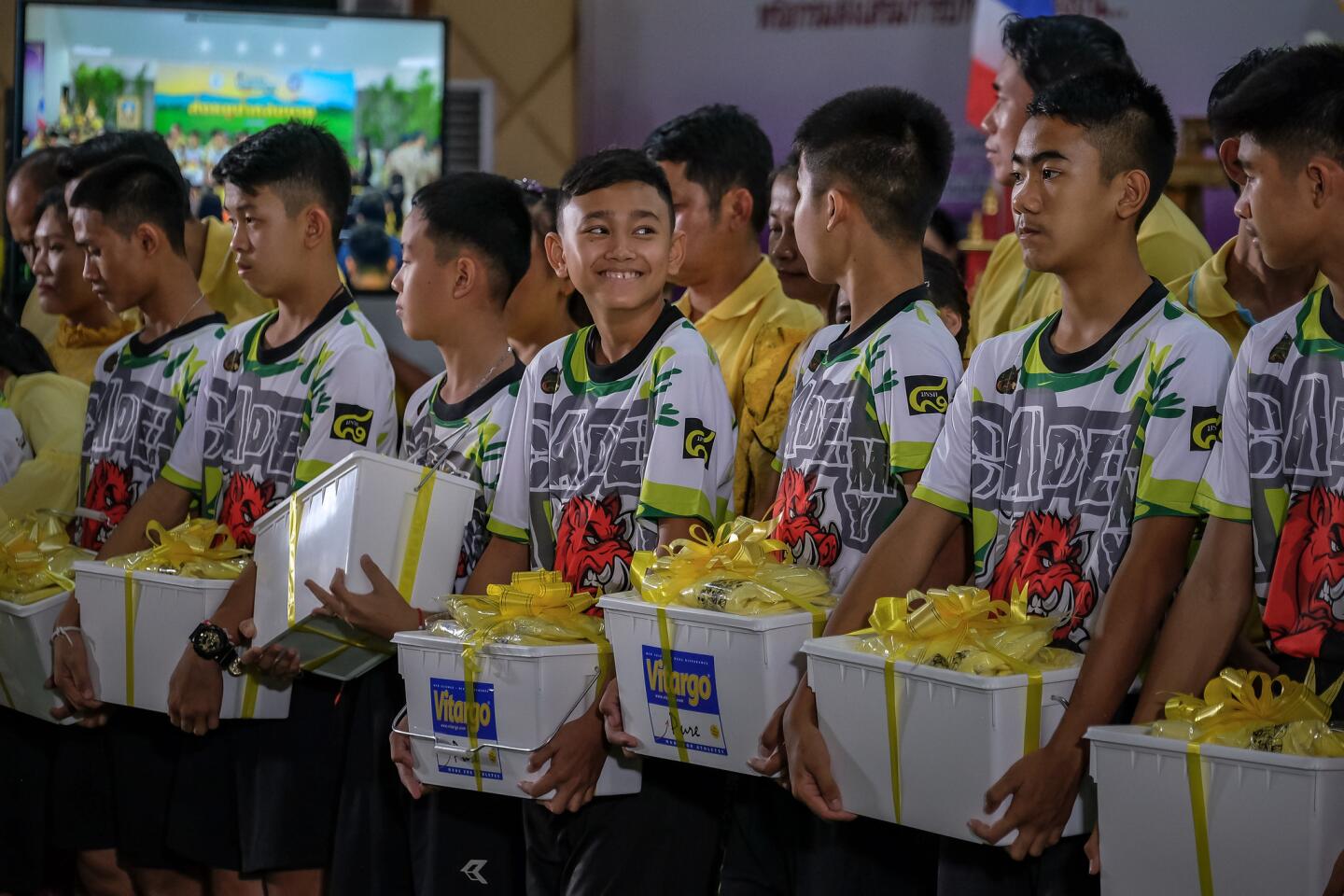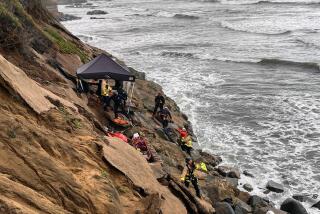Thai boys, released from hospital, recount getting trapped in a cave, drinking water from rock walls
- Share via
They were only supposed to be gone an hour. They brought no food, only a rope and flashlights they had stuffed into their soccer bags without telling their parents where they were going.
The 12 boys had persuaded their 25-year-old coach to take them after soccer practice to the Tham Luang Nang Non cave in northern Thailand, a 6-mile-long maze of winding passageways, jagged rocks and dark pools — a young explorer’s dream.
And as they explored, the rains came.
With frightening speed, the waters unleashed by a monsoon storm flooded the cave, forcing the boys and their coach to lick water off the rock walls to survive until they were extracted by an international rescue effort involving thousands of volunteers and expert divers, one of whom would lose his life.
“I believe we were careless with our lives,” one of the boys, Adul Samon, said Wednesday during their first public appearance since their rescue. “It was something we did not expect.”
The saga of the Wild Boars youth soccer team has captivated the world — from their disappearance June 23, to their being discovered alive and in good spirits by a pair of British divers nine days later, and ultimately to their dramatic rescue over three heart-pounding days during which some of the boys were carried out of the cave sedated and tied to stretchers.
But at a televised news conference in the northern city of Chiang Rai, the boys ages 11 to 16 looked — miraculously, in many respects — like ordinary, soccer-mad youths and not the survivors of an ordeal worthy of a Hollywood thriller.
Sporting fresh haircuts and matching shirts emblazoned with a red wild boar team logo, the boys greeted teammates they hadn’t seen in weeks before taking seats on a podium alongside two doctors.
They apologized to their parents and Thai authorities for the trouble they had caused. More excitedly, they described the meals they’d eaten — pork and rice, bread with chocolate spread — in the Chiang Rai hospital where they had spent the last week being treated for minor infections and putting on some of the weight they had lost.
Doctors said the boys had added an average of 6 pounds each and were healthy enough and psychologically fit to be discharged Wednesday.
“I am sure they are ready,” said Lt. Col. Phak Lohanchun, a Thai army doctor and diver who spent days with the boys inside the cave after they were found July 2.

Before going home with their families, the boys addressed a throng of reporters at a tightly controlled news conference, answering questions that had been prescreened by psychiatrists to minimize stress.
The boys and their coach recounted how they planned to be inside only for about an hour, because one of them was expected home for his birthday party and another had a tutoring session. But they ventured so far inside the cave that they couldn’t hear the storm.
When they turned back to leave, they found themselves trapped by about 10 feet of water. Their coach, Ekapol Chanthawong, went deeper into the cave in the gathering dark to search for an exit. The boys trailed behind holding the rope, because by then he and the boys couldn’t see one another.
When Ekapol pulled on the rope twice, it meant they couldn’t go any farther. Eventually, they found a partially dry slope where they decided to spend the night, believing the water would recede by the morning.
“I told them: Don’t worry, the water might just rise and fall, and tomorrow it might go down,” Ekapol said. “I really thought it was an overnight thing.”
They lay down to sleep on the slope, and Ekapol told the boys to pray.
Over the next few days, the water levels would not fall, and they grew increasingly desperate. Without food, they stayed alive by drinking the naturally filtered water that dripped from the stalactites.
“After two days, I started to feel weak,” said Pornchai Kamluang, 16.
“We tried not to think of food, like fried rice, because it would make us hungrier,” said the youngest boy, 11-year-old Chanin Wiboonrungrueng.
Ekapol told the boys to switch off their flashlights to conserve battery power. At one point they took turns digging at the muddy cave walls with their hands, searching for a way out.
“We didn’t want to do nothing and just wait for help,” Ekapol said. “So we dug holes to find a way to escape and stopped when we were tired.”
Finally, one evening, the boys thought they heard voices echoing from somewhere within the cavern.
Ekapol told the group to quiet down, recalled 14-year-old Adul.
“We weren’t sure if it was real,” Adul said. “So we stopped and listened, and it was actually real. There was someone there.”
Adul clambered down the slope holding a flashlight. Then a diver emerged from the dark, still water.
“It was very magical,” he said. “I was very shocked. Initially I thought it was a Thai, but I was surprised they were from the U.K. I didn’t know what to say, so all I could say was, ‘Hello.’”
One of the divers asked how many were in their group.
“I said, ‘We have 13 people,’” Adul said — meaning all the missing were accounted for.
“Brilliant,” the diver said.
But the rescue would take days.
Not all the boys were strong swimmers and Thai authorities didn’t know if they could make it back to the mouth of the cave even escorted by expert divers. High-powered pumps drew millions of gallons of water out of the cave but the dive remained risky.
The boys were given high-protein gels to raise their strength, and given lessons in diving.
They continued to pray and, under Ekapol’s tutelage, meditate. And they dreamed of returning home, writing contrite letters divers ferried back to their anxious parents. “I’m doing fine, but the air is a little cold, but don’t worry,” wrote Duangphet “Tom” Promthep. “Although don’t forget to set up my birthday party.” One boy murmured in his sleep about congee, a porridge-like comfort food.
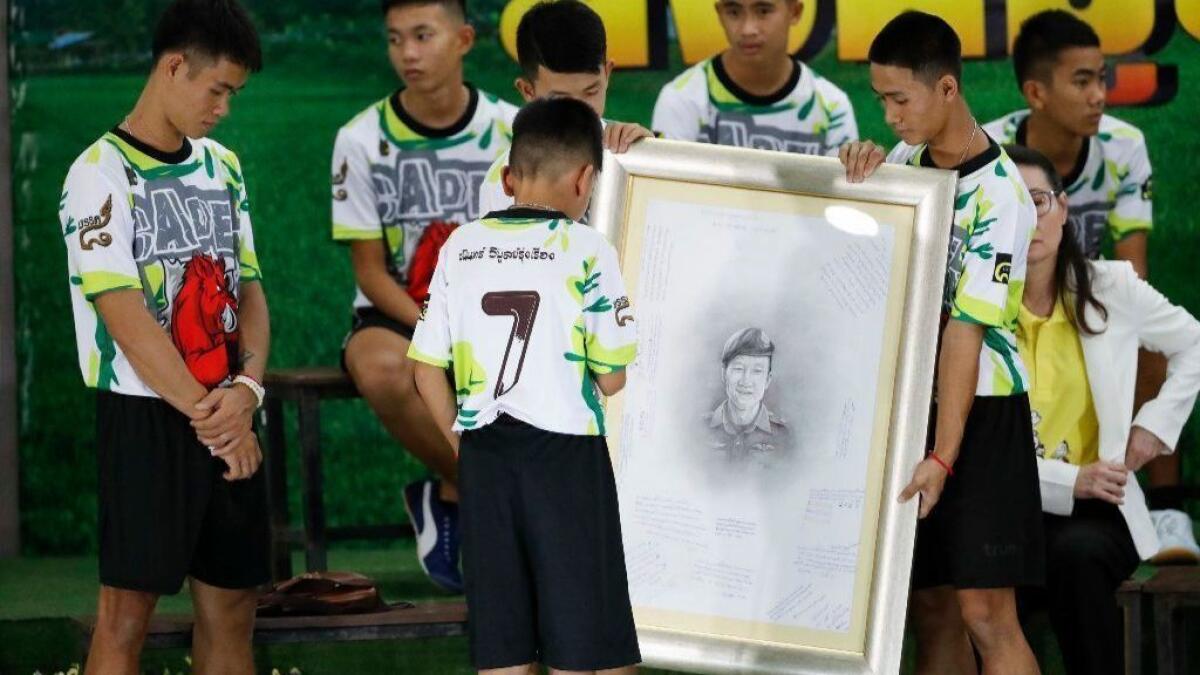
Days before the rescue would begin, one retired Thai navy SEAL, Saman Kunan, died while replenishing air tanks along the escape route.
“We feel very sad” about his death, Ekapol said. “We are very thankful that he was willing to sacrifice himself to rescue us, to bring us out of the cave so we could lead a normal life.”
Ekapol said that to honor Saman’s memory, he and each of the boys would become ordained as monks. According to Thai tradition, boys typically become monks for temporary periods to do charity work.
The group was asked by a host whether they had learned any lessons from their ordeal.
“This experience will affect me in both good and bad ways in the future,” Adul said. “I will be very careful with my life and I will live my life fully.”
Chanin said the experience “made us stronger and taught us to persevere.”
But the 11-year-old had a quick answer when asked if he would go back to the cave: “No,” he said, to laughter.
Shashank Bengali is South Asia correspondent for The Times. Follow him on Twitter at @SBengali
UPDATES:
4:25 p.m.: This article was updated throughout with comments from the rescued boys and their coach.
9 a.m.: This article was updated with additional descriptions from the boys.
This article was originally published at 6:50 a.m.
More to Read
Sign up for Essential California
The most important California stories and recommendations in your inbox every morning.
You may occasionally receive promotional content from the Los Angeles Times.
